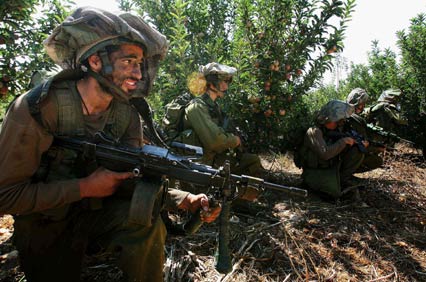Figures released by the Israeli army show the pace of
Hezbollah rockets raining down on Israel has not slowed, and the guerrillas are
nowhere close to being neutralized. (click to see full coverage on Middle
East Conflict)
|

Israeli soldiers take up positions as they advance towards
Israel-Lebanon border July 20, 2006.
[Reuters]
|
Air power alone is proving insufficient to rout Hezbollah, whose
determination and intimate knowledge of the terrain are making them a
tougher-than-expected foe.
Mideast observers say Hezbollah only has to remain standing, not beat Israel,
to emerge victorious in Arab eyes.
Hezbollah actions such as blowing up an Israeli warship with an Iranian-made
radar-guided missile or firing rockets at the once out-of-range city of Haifa
have shattered taboos and astounded Israel and the world.
The Shiite group has built Viet Cong-style bunkers and tunnels near the
Israeli border to shelter weapons and fighters, and its members easily blend in
among civilians.
"You are dealing with groups of 10 to 12 very well organized, very well
trained people who work out of their homes," said Timur Goksel, a university
professor who spent more than two decades as a senior UN adviser in south
Lebanon. "Don't underestimate the resilience of these people."
Israel says it has already taken out nearly half of the estimated 10,000 to
12,000 Hezbollah rockets in south Lebanon, and that its blockade of the country
should help keep the guerrillas from restocking.
But Israeli army figures show there's been no letup in the number of rockets
Hezbollah has fired at Israel. Since fighting began, the count stands at more
than 1,100, with the number more or less evenly divided over the past 12 days.
At least 80 rockets hit Israel on Monday, and two days ago the number was 129.
Most of Hezbollah's rockets have been Iranian-made Katyushas and Syrian-made
Raads, with ranges up to 28 miles. Israel also believes Hezbollah possesses the
Iranian-made "Zalzal" rocket, which has the range to hit Tel Aviv and cities
farther south.
"Certainly Hezbollah doesn't seem to have suffered many casualties and I
don't think their military capability has been degraded," Goksel said.
Israel's army chief of staff maintained Friday that nearly 100 guerrillas had
been killed in fighting that broke out July 12 when Hezbollah crossed into
Israel and captured two Israeli soldiers. But military officials have privately
lamented what they called the low number of Hezbollah casualties. Hezbollah
itself reports only 11 dead.
Fearing a prolonged quagmire and heavy casualties among its troops, Israel
says it has no intention of launching a massive land invasion to defeat
Hezbollah. But the past several days' small-scale pinpoint operations to root
out guerrilla positions along the border are proving far more daunting than
expected, according to soldiers returning from battle.
The troops complain of difficult terrain and being surprised by Hezbollah
guerrillas who pop out from behind bushes firing automatic weapons or
rocket-propelled grenades. Two Israeli soldiers were killed and 20 were wounded
Monday as they tried to take the southern Lebanese town of Bint Jbail amid a
heavy exchange of gunfire, missiles and mortars.
The pinpoint incursions are supposed to accomplish what the 4,000 Israeli air
sorties have been unable to achieve. But the twin strategy of airstrikes and
limited ground offensives will not be enough to force Hezbollah to refrain from
launching attacks, said Israeli counter terrorism expert Boaz Ganor.
The issue is fraught with dilemmas for the Jewish state.
Israel is determined not to reoccupy south Lebanon as it did disastrously
from 1982 to 2000, but that may be the only way to neutralize Hezbollah.
Israel might want to use a cease-fire to achieve its strategic goals. But a
cease-fire that leaves Hezbollah's fighting ability intact could, in the eyes of
many Israelis, cause irreparable damage to Israel's deterrent posture and hand a
major victory to archenemy Iran, Hezbollah's prime supporter.
Israeli Cabinet minister Avi Dichter insisted the army's offensive is going
fine and that Israel can't be expected to achieve its military objectives
overnight, especially given what he said was the government's determination to
limit casualties among civilians and Israeli soldiers.
"We know that only in Hollywood it starts at 8 and ends at 10 and normally
it's a happy end," he said.
More than 350 people have been killed in Lebanon since the fighting began,
according to security officials. Some 600,000 people have fled their homes.
More than 35 Israeli's have died, including 22 soldiers.
If Hezbollah emerges from the fighting with its "military arm more or less
intact ... my God they're going to use it as a victory," Goksel said.
"As long as they don't lose, they don't have to win ... because they'll be
standing up to the Israelis and in this part of the world that is a
victory."